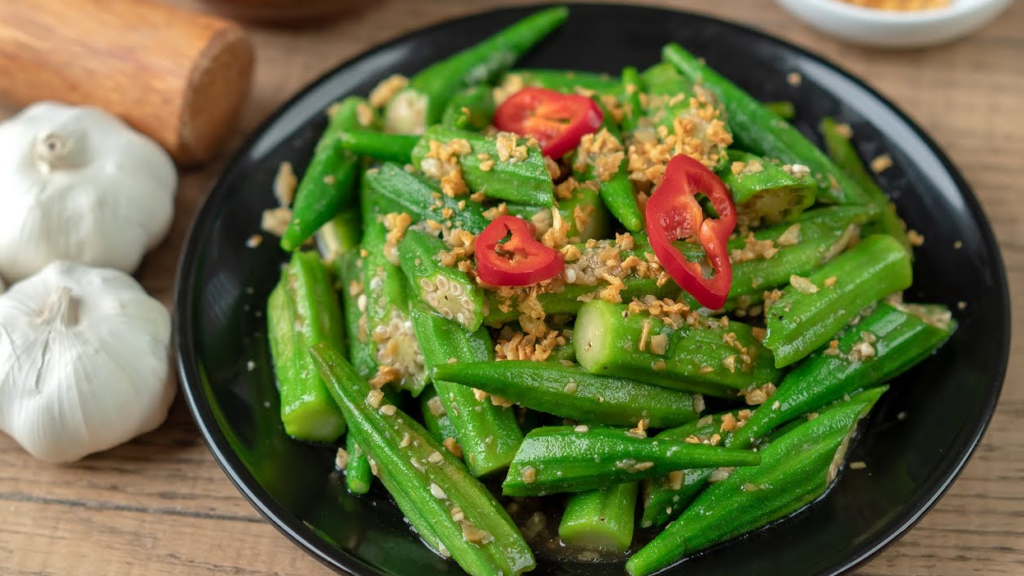Okra, also known as “lady’s finger,” is a powerhouse of nutrients and offers a myriad of health benefits. This green pod vegetable is packed with essential vitamins, minerals, and fiber, making it a valuable addition to any balanced diet. Let’s explore the numerous ways okra can benefit your health and how to make the most of it in your daily routine.

1. Rich in Nutrients
Okra is an excellent source of vitamins A, C, and K, as well as B vitamins, magnesium, calcium, and potassium. Each of these nutrients plays an essential role in maintaining various bodily functions, such as strengthening the immune system, supporting healthy skin and bones, and aiding cellular metabolism.
Vitamin C supports immune function and skin health.
Vitamin K is essential for bone health and blood clotting.
Vitamin A helps maintain healthy vision and supports skin health.
2. High in Fiber

One of okra’s standout features is its high fiber content, particularly soluble fiber. This type of fiber promotes digestive health by aiding regular bowel movements and preventing constipation. Additionally, soluble fiber can help lower cholesterol levels by binding to cholesterol particles in the intestine, preventing them from entering the bloodstream.
3. Supports Heart Health
Okra’s fiber, particularly pectin, has been shown to reduce LDL (bad) cholesterol levels. Lower cholesterol levels mean a decreased risk of heart disease, making okra a heart-friendly addition to any diet. Moreover, the antioxidants in okra, such as flavonoids and polyphenols, further help combat oxidative stress and inflammation, which are risk factors for cardiovascular disease.
4. Helps Regulate Blood Sugar
For those managing blood sugar levels, okra can be a valuable ally. Studies have suggested that the high fiber content and compounds in okra may help reduce the absorption of sugars in the intestine, leading to more stable blood sugar levels. While it should not replace prescribed medications for diabetes, okra can be part of a balanced, diabetes-friendly diet.
5. Beneficial for Skin and Hair Health
Rich in antioxidants, okra can be beneficial for both skin and hair health. Antioxidants help to fight free radicals, which are responsible for premature aging. The mucilage (a gel-like substance) in okra can also be applied to the scalp and hair, acting as a natural conditioner to hydrate, nourish, and improve hair texture.

6. Boosts Immunity
With its high vitamin C and antioxidant content, okra supports immune function by protecting cells from damage and encouraging the production of white blood cells, the body’s first line of defense against pathogens.
7. Great for Weight Management
Due to its low calorie content and high fiber, okra is ideal for those looking to maintain a healthy weight. The fiber in okra helps you feel fuller for longer, reducing the chances of overeating.

Tips for Including Okra in Your Diet
-
Steamed or Boiled: Lightly steaming or boiling okra preserves its nutrients while giving it a pleasant texture. Add it to salads or soups for an extra boost of fiber and vitamins.
Grilled or Roasted: Tossing okra in a bit of olive oil, salt, and pepper, then roasting it in the oven gives it a deliciously crispy texture that pairs well with various dishes.
Okra Water: For a simple health tonic, soak sliced okra in water overnight and drink it in the morning. Okra water is believed to provide additional hydration and may aid in stabilizing blood sugar levels.
Add to Soups and Stews: Okra is a staple ingredient in many soups and stews, especially in cuisines from the southern United States and parts of Africa. It adds thickness and a unique flavor to dishes, making it a versatile ingredient in cooking.
Final Thoughts

Okra is more than just a versatile vegetable; it’s a natural superfood packed with benefits for the heart, digestive system, and immune function. By incorporating okra into your diet in creative ways, you can enjoy both its unique taste and its wealth of nutrients, helping you maintain a healthy lifestyle.
News
JJ Redick reacts to Luka Doncic trade for Anthony Davis
In one of the most jaw-dropping moves of the season, the NBA landscape was rocked by the blockbuster trade involving Luka Dončić and Anthony Davis—a swap that has sent ripples of excitement, disbelief, and heated discussion through the league. Among…
Anthony Davis FULL reaction to trade to Mavericks for Luka Doncic
In a blockbuster move that sent shockwaves through the NBA and left fans reeling, Anthony Davis has been traded to the Dallas Mavericks in exchange for Luka Dončić. In the immediate aftermath of the news, Davis took to the media…
Shaq reacts to Dallas Mavericks wanting Kevin Durant after Luka-AD trade 
In the constantly shifting world of the NBA, trade rumors and blockbuster moves are a regular part of the season’s drama. The latest twist has fans buzzing: the Dallas Mavericks have reportedly set their sights on acquiring Kevin Durant in…
Donovan Mitchell FILTHY poster dunk on Kristaps Porzingis 
In a game filled with high-intensity moments and jaw-dropping highlights, one play in particular has left fans and analysts buzzing about Donovan Mitchell’s latest display of athleticism. Early in the contest, with the atmosphere already charged by an evenly matched…
Joel Embiid hits go-ahead bucket vs Mavs then chats with Anthony Davis after game
In one of the most thrilling contests of the season, Joel Embiid delivered a clutch performance against the Dallas Mavericks, punctuating the game with a go-ahead bucket that sent the home crowd into a frenzy. The atmosphere in the arena…
D’Angelo Russell game winner as Nets hit two 3’s in 3 seconds to win vs Rockets 
In one of the most electrifying moments in recent NBA history, D’Angelo Russell delivered an unforgettable game-winner that left fans and commentators in complete awe. With the Brooklyn Nets locked in a tense battle against the Houston Rockets, the outcome…
End of content
No more pages to load











